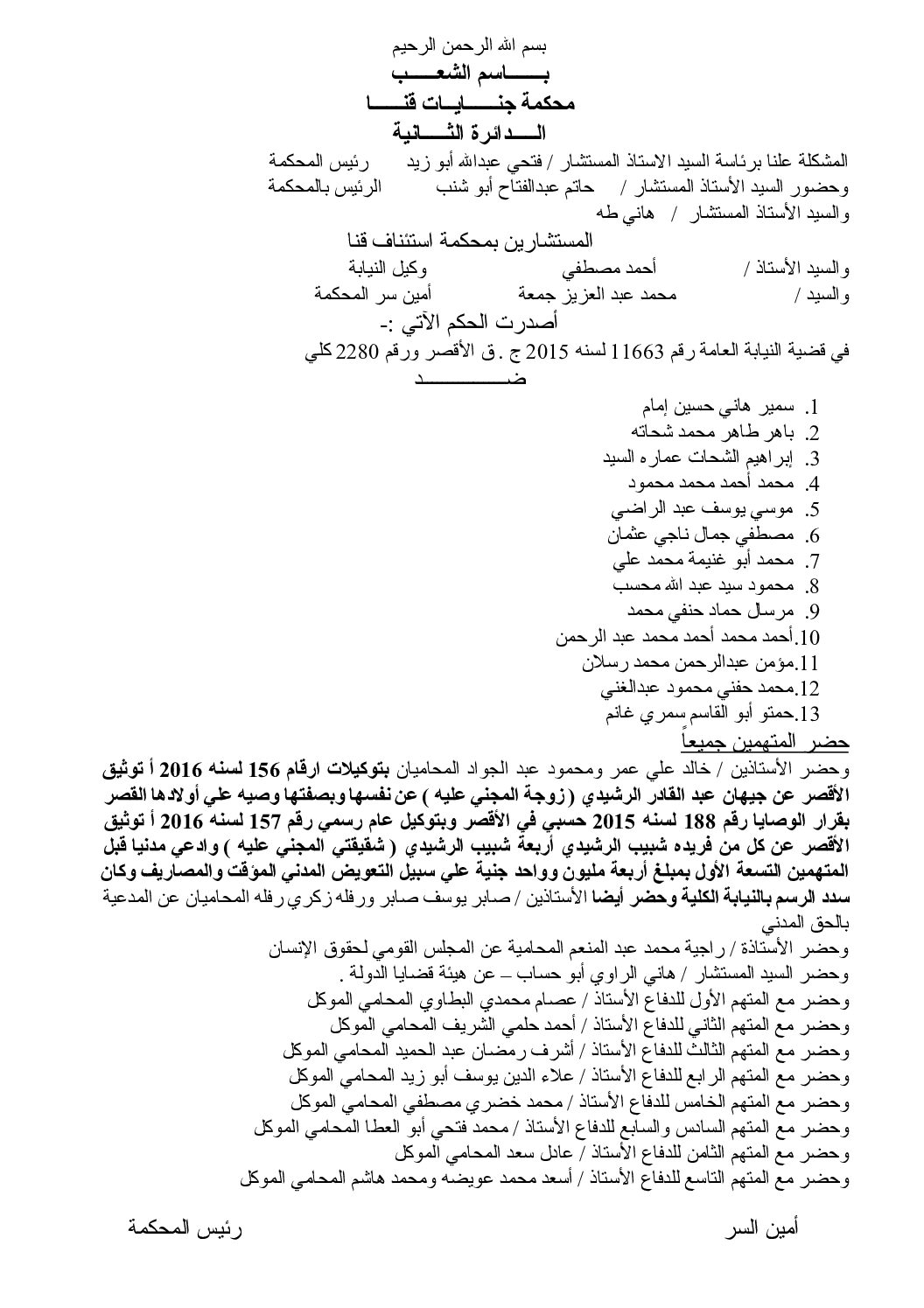Conference Coverage: “That’s Why Workers Protest, This Is Why We Drafted New Labor Law” Conference Held Today at ECESR

That’s Why Workers Protest, This Is Why We Drafted New Labor Law
In collaboration with Towards Just Labor Act Campaign, the ECESR held today a press conference entitled “That’s Why Workers Protest & for This We Drafted a New Labor Law”.
The conference highlighted the recent labor protests and their causes in a number of factories and companies, which ranged from factories lockouts, abstaining from paying due salaries, to not fulfilling the outstanding demands for years.
Brick Factories Union
On behalf of brick industry workers, Reda Salam, El-Saf brick factories syndicalist, took the floor and said: “there are a thousand brick factories with 500 thousand laborers working without social security except for 4 workers. We do not have a trade union. Manpower inspectors do not properly do their work because all factory owners are businessmen. Social security, in our case, is only applicable on 1% of the labor force, and we have no health insurance. There are many cases of injuries such as leg amputation. Many workers were dismissed; however, the Manpower Department had not taken a supportive attitude towards us. In all cases the undersecretary of Manpower Ministry asks us to call the factory owner to negotiate with them, how are we supposed to bring them?”
On the working conditions that led to the strike, he said: “workers are working 13 to 14 hours a day; they carry about 60 tons of clay per day. When a worker gets sick or dies, his children work instead of him—there are more than 20 children in each factory. We decided to make a bakery within the factories to help workers secure their bread, but when we tried to extract the permits the officials refused. In the same context, we tried to get approval to build a hospital but they also refused. Factories are full of many irregularities such as non-availability of industrial safety and fire extinguishers. There are 264 cases of renal failure among brick workers in Atfeeh area alone.” He pointed out that most of the brick workers were university graduates. In spite of the work harsh conditions, they haven’t received any increase in salaries for 7 years, he said. When we demanded an increase of only two pounds, they refused and gave us a quarter of pounds. What a huge increase, he exclaimed!
About the strike, he added: “in spite of giving notice to the concerned parties and getting permission to go on strike, 15 days passed of the strike without paying attention to our demands, except for hurling accusations and calling us Brotherhood affiliates. Factory owners always say nothing is going to change whatever you do, and police officers come to us everyday to make sure that our strike does not go beyond the limits and extend to blocking the road.”
Salam confirmed that the brick workers threatened to escalate with the beginning of next week if steps were not taken toward solving their problems. The Constitution recognized the right to an annual increase, insurance and employment contracts, he said.
On behalf of Nasr factory for castings, Azzedine Tantawi said: “The holding company has taken strict measures against workers that led to lower worker’s wages in half. After we agreed to end the strike, which continued for 46 days, on the basis of paying our due payments, they made a decision depriving us of 70 % of the incentives after the General Assembly meeting.”
Sayyed Sultan, head of the company’s Union Committee, added: “We wrote notes and telegraphs to the concerned officials but to no avail. When we went to the Manpower Department, they told us to resume work first. The wage crisis went on, though, the company produces steel pipes for gas companies, etc., and our pipes are the best in the field.”
“Towards Unified Labor Law” campaign
Fatima Ramadan, a member of “Towards Just Labor Act” campaign, began with paying tribute to Coke workers’ strike and workers of the public sector companies. She urged them to learn the lesson of solidarity because the state is against the interests of workers and in favor of businessmen, she concluded.
Even if you lose your wage today, you will win your future and the future of your children and ensure sound work terms, Ramadan said. She pointed out that since 2003 workers had suffered from Labor Act 12, which did not support workers even if they were discharged. So we have to think about the laws drafted against us because the government installed after the revolution is trying to draft a far worse law, she said.
Among the worst things, for instance, is that the worker goes under medical examination on infectious diseases periodically, although he had gone through this at the beginning of his work. This process enables the employer to punish the worker, although he got inflicted during work, she explained. She asserted that workers must draw up their law so that they protect themselves. The bad laws passed by Ahmed Ezz and Abou-el-Anin had wasted the right of workers, so we must not let them do it again, Ramadan added.
Bohira Joint Stock Company
On behalf of Bohira Joint Stock Company, Islam Mohammed took the floor and said: “Prime Minister Ibrahim Mahlab, who visited one branch of the company before Eid, said that this branch was wasting public money and that the company’s management was reckless. Workers have documents that expose the corruption of the Chairman of the Holding Company.” He pointed out that workers do not find their livelihoods because of the rampant corruption. There are workers employed in Toshka project under harsh conditions and lower wages, he added. Walid Ibn Talal bought the acre with 50 pounds, so why not sell it for workers at 100 pounds, aren’t they the most favored? She asked.
He indicated that workers were not paid any wages for 7 months—predicting that the fate of the Suez Canal workers will be the same as Bohira Joint Stock Company workers. The government launched projects for business and not for the benefit of development and the interests of citizens, he added.
Tanta Flax
Jamal Othman, a Tanta Flax Company worker, said: “There is about 4 million pounds worth flux within the company, but so far it has not been used. Since these materials are vulnerable to damage or burning, we have informed the minister who said we would see. There is another problem. In default of non-distribution of flaxseed, the peasants will not be able to timely cultivate the flax crop and therefore there will be no harvest for two years. We told the minister that the company would not be run for two years, even if they took a decision of operation.” He pointed out that the holding company had no intention to run the company and would not take any step to run it.
Next conference
“Towards Unified Labor Law” campaign will hold next Friday, August 29, a public conference entitled “Labor rights and problems between the current labor law and the two drafts drawn by the government and Towards Just Labor Act campaign”.
The conference addresses the labor rights wasted under the current labor law and the draft law presented by the Ministry of Manpower. It poses the pro-business policy that observes the interests of businessmen and company owners at the expense of workers’ interests and rights. It addresses also the solutions provided by “Towards Just Labor Act” campaign in an attempt to pass a fair law that creates a balance between the interests of workers and employers as parties to the employment relationship.

